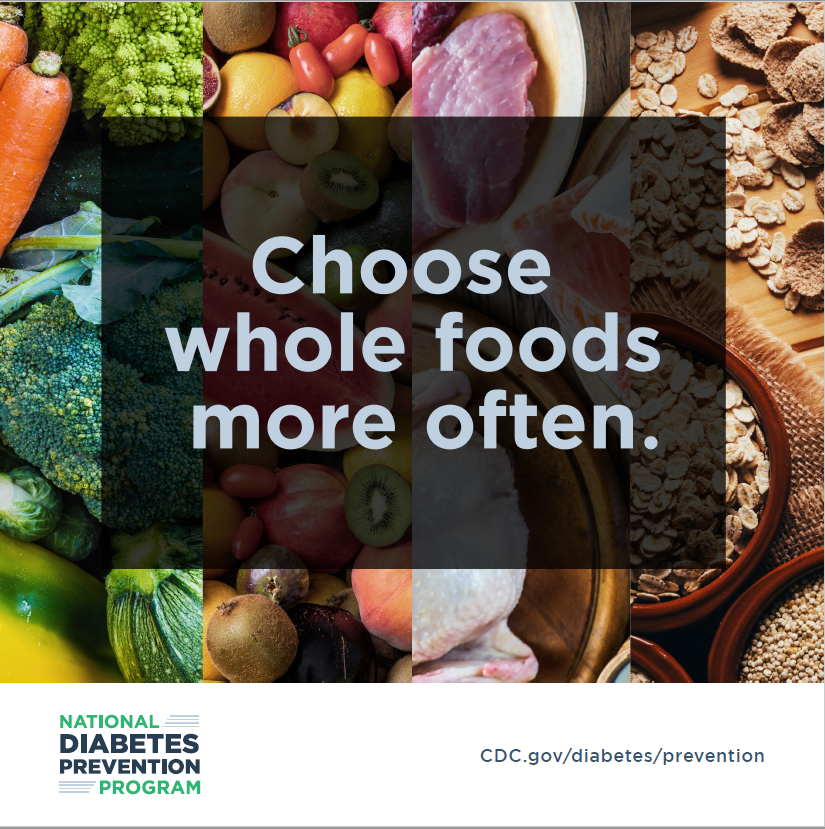 Healthy eating – it’s something that everyone knows is important, but it can feel like a chore. Maybe you feel pressure to always make the “right” choice. But what if you got rid of the idea of good foods and bad foods, and instead focused on small changes you could make to your eating habits to improve your health for you and your family? That’s what the lifestyle coaches from CDC’s National Diabetes Prevention Program (National DPP) lifestyle change program encourage – making small changes that can make a big difference to your overall health.
Healthy eating – it’s something that everyone knows is important, but it can feel like a chore. Maybe you feel pressure to always make the “right” choice. But what if you got rid of the idea of good foods and bad foods, and instead focused on small changes you could make to your eating habits to improve your health for you and your family? That’s what the lifestyle coaches from CDC’s National Diabetes Prevention Program (National DPP) lifestyle change program encourage – making small changes that can make a big difference to your overall health.
Learning To Make Better Choices
Jack Aponte didn’t consider himself a healthy eater until he participated in the National DPP lifestyle change program and learned a few tips from his lifestyle coach.
“I have an extremely large appetite,” says Jack. “My coach would make suggestions like, instead of these chips, try these chips. It wasn’t invasive. It wasn’t someone standing over you telling you what to do.”
Jack signed up for the program at the urging of his wife after he discovered he was at risk for developing type 2 diabetes. Change Your Lifestyle. Change Your Life. (CYL2), , part of the CDC-led National DPP lifestyle change program, is proven to reduce participants’ risk of developing type 2 diabetes by more than 50%. Through the class, participants work with a trained lifestyle coach and a team of fellow participants who can encourage and challenge each other along the way.
“I grew up eating beautiful Italian meals like pasta and pizza,” Jack continues. “Through the program, I learned I didn’t have to give up all of that. I changed the portions a little bit. My wife and I managed to change a couple of things in the recipes. If you don’t bread it and you don’t fry it, you can still have it.”
Lifestyle Tips To Try This March
This March for National Nutrition Month, here are a few tips from the lifestyle change coaches:
- Try making one small swap at a time. Focus on choosing whole foods, such as an apple instead of applesauce. When going out to eat, you could try ordering a side salad or favorite veggie instead of fries or skipping the bun on your burger. Try adding an extra serving of vegetables to your plate. With small steps, your health can see big improvements over time.
- If you’re not much of a cook, talk to the person in your family who does most of the cooking. Let them know you’d like to start eating healthier. Make some suggestions for things you already know you like to eat and offer to do the dishes to show your appreciation.
- No one ever won a championship on their own, so try asking your friends and family members to join you. You can make it a competition to see who eats the most servings of fruits and vegetables in a day.
If you’re ready to take the next step, learn more about joining CYL2 by visiting https://www.thewellnesscoalition.org/cyl2/.
“With this program, it’s not like you’re on a diet,” concludes Jack. “You just make adjustments to your life that will last a lifetime. And it doesn’t mean you have to end your life – once a week you can still go out and have some ice cream.”
